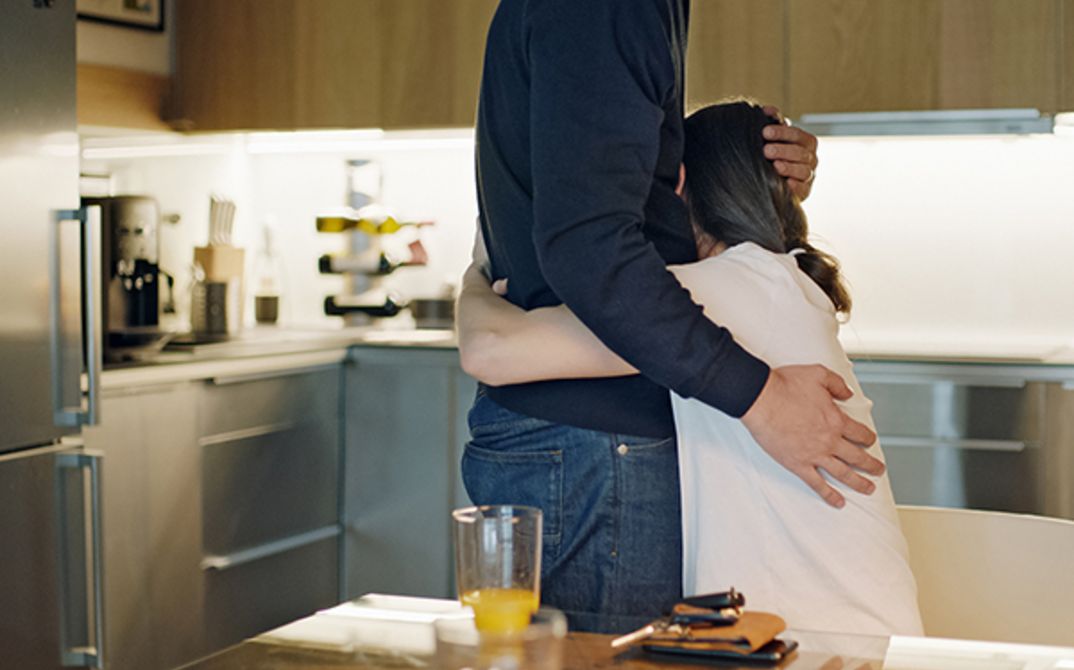A reversed love story
In the last scene of MONȘTRI., Dana asks Arthur, ‘Why did you stay with me all these years?’ To which he replies, ‘Why did you stay with me? Why are you still staying with me?’ MONȘTRI. is a reversed love story, a film about longing, about how far one can go in order to meet and be with another.
The film takes place in Bucharest over 24 hours and it is structured in three parts: one part is dedicated Dana, another to Arthur, and the last to the two of them together. The first two parts take place on the same night, when the protagonists, separately yet simultaneously, avoid going home, preferring the company of strangers: Dana goes so far as paying a taxi driver to stay in the car with her for the night, whereas Arthur first wanders around the city and then decides to meet a man through a dating app. However, as much as they have tried to avoid it, the following day they need to face reality. And sometimes the biggest proof of love can be letting go of one another.
The project started as a series of interviews with couples who had been married a long time – interviews about love, about the need to be with someone, about what one is willing to do for love, about how this changes with time, about what you do when love is gone, about compromise. Through these interviews I met a married man desperate to fit in, to behave well, to be a good believer, to meet the standards of a perfect family, even though none of these things reflected his personality and he was really unhappy as a result. A very quiet, introverted man: Arthur. I never met his wife and I chose to come up with this side of the story myself: Dana.
Delicate topic: homosexuality
Romania is as traditional as it is restrictive. In Arthur I see a reflection of society’s values and limitations. The clash between my characters’ values and those of society is discrete, yet always noticeable.
I wrote the script as organically as possible, questioning every fictional element and trying to reveal the deep humanity that lies within my characters’ desperate quest for love. At the same time, it was important to me that I retain the dissonances, the absurdity and humour contained in what was an unspeakably sad situation.
The casting was difficult. Given the reluctance amongst Romanian actors to play a gay character, it was quite a challenge to find the right actor. In this respect, the film is a first in Romanian cinema. Dana was also a tough character to cast, because of the delicate mix of strength and fragility.
Before we started shooting, I tried something I had never tried before: after discussing the characters with the actors and going through extensive rehearsals, I took them to couples’ counselling and asked them to stay in character and see if they could improve their relationship. The results were amazing. The insight we gained allowed us to go much further than what was in the script and also revealed things about ourselves that we had not been aware of.
We shot chronologically and I constantly rewrote the script based on the discoveries made on set, always trying to find the truth of each scene. That is why it was vitally important for me to work with new, fresh actors, ones who were not only willing to play their characters well, but also to grow into them.
I had already put together a creative team during the production of my short film TIE (2015), and they were also the starting point for this feature. Together with the DP and production designer, we translated words and meanings into visuals, trying to give an identity and a voice to each space and each moment.
Bucharest as a character
Our aim was to give MONȘTRI. a unique and compelling identity that would match the film’s themes. The apartments that appear in the film were built in different eras, spanning a period of almost 50 years. Each of them tells a discrete yet clear story about the characters who live there. Through the spaces, the homes and their inhabitants, we wanted to create a sort of X-ray of Romanian society: the communist apartment buildings of the 70s and the 80s, the lack of style and concept of the apartments from the 90s, the pretentious and stylised interiors of the last 10 years – all these say something about the characters. I also wanted for Bucharest to be a character. The city is also a monster, an embattled place. In a way, Dana and Arthur were created by this city, as were the people they encounter. There is a lot of make-believe and the sense of a lacking clear identity.
MONȘTRI. is shot in different aspect ratios, depending on whether the protagonists are separated or together. We wanted to give the impression that the picture was complete only when Dana and Arthur were together, and that a narrow perspective always makes you lose things from view.
I would like to end by saying that I consider MONȘTRI. to be a necessary film. In a climate of increasing intolerance towards people who are different, I needed to challenge the viewer’s perception, to question the gap between what we project and who we really are. I hope that MONȘTRI. is a film that will encourage viewers to question their own lives and be more tolerant towards themselves and the people around them. (Marius Olteanu)
